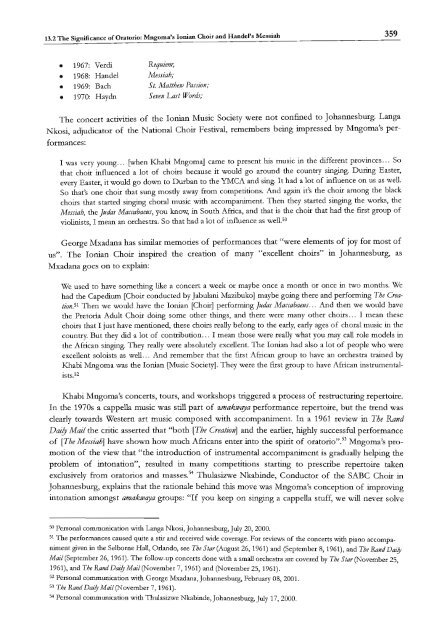South African Choral Music (Amakwaya): Song, Contest and the ...
South African Choral Music (Amakwaya): Song, Contest and the ...
South African Choral Music (Amakwaya): Song, Contest and the ...
Create successful ePaper yourself
Turn your PDF publications into a flip-book with our unique Google optimized e-Paper software.
13.2 The Significance ofOratorio: Mngoma's Ionian Choir <strong>and</strong> H<strong>and</strong>el's Messiah<br />
• 1967: Verdi Requiem;<br />
• 1968: H<strong>and</strong>el Messiah;<br />
• 1969: Bach 5t. Mat<strong>the</strong>w Passion;<br />
• 1970: Haydn 5even ust Wordr;<br />
The concert activities of <strong>the</strong> Ionian <strong>Music</strong> Society were not confined to Johannesburg. Langa<br />
Nkosi, adjudicator of <strong>the</strong> National Choir Festival, remembers being impressed by Mngoma's per<br />
formances:<br />
I was very young... [when Khabi Mngoma] came to present his music in <strong>the</strong> different provinces... So<br />
that choir influenced a lot of choirs because it would go around <strong>the</strong> country singing. During Easter,<br />
every Easter, it would go down to Durban to <strong>the</strong> YMCA <strong>and</strong> sing. It had a lot of influence on us as well.<br />
So that's one choir that sung mosdy away from competitions. And again it's <strong>the</strong> choir among <strong>the</strong> black<br />
choirs that started singing choral music with accompaniment. Then <strong>the</strong>y started singing <strong>the</strong> works, <strong>the</strong><br />
Messiah, <strong>the</strong> Judas Maccabaeus, you knoW; in <strong>South</strong> Africa, <strong>and</strong> that is <strong>the</strong> choir that had <strong>the</strong> fIrst group of<br />
violinists, I mean an orchestra. So that had a lot of influence as well.50<br />
George Mxadana has similar memories of performances that "were elements of joy for most of<br />
us". The Ionian Choir inspired <strong>the</strong> creation of many "excellent choirs" in Johannesburg, as<br />
Mxadana goes on to explain:<br />
We used to have something like a concert a week or maybe once a month or once in two months. We<br />
had <strong>the</strong> Capedium [Choir conducted by Jabulani Mazibuko] maybe going <strong>the</strong>re <strong>and</strong> performing The Creation.<br />
51 Then we would have <strong>the</strong> Ionian [Choir] performing Judas Maccabaeus... And <strong>the</strong>n we would have<br />
<strong>the</strong> Pretoria Adult Choir doing some o<strong>the</strong>r things, <strong>and</strong> <strong>the</strong>re were many o<strong>the</strong>r choirs... I mean <strong>the</strong>se<br />
choirs that I just have mentioned, <strong>the</strong>se choirs really belong to <strong>the</strong> early, early ages of choral music in <strong>the</strong><br />
country. But <strong>the</strong>y did a lot of contribution... I mean those were really what you may call role models in<br />
<strong>the</strong> <strong>African</strong> singing. They really were absolutely excellent. The Ionian had also a lot of people who were<br />
excellent soloists as well... And remember that <strong>the</strong> f1rst <strong>African</strong> group to have an orchestra trained by<br />
Khabi Mngoma was <strong>the</strong> Ionian [<strong>Music</strong> Society]. They were <strong>the</strong> f1rst group to have <strong>African</strong> instrumentalists.<br />
52<br />
Khabi Mngoma's concerts, tours, <strong>and</strong> workshops triggered a process of restructuring repertoire.<br />
In <strong>the</strong> 1970s a cappella music was still part of amakwqya performance repertoire, but <strong>the</strong> trend was<br />
clearly towards Western art music composed with accompaniment. In a 1961 review in The R<strong>and</strong><br />
DailY Mail <strong>the</strong> critic asserted that "both [The Creation] <strong>and</strong> <strong>the</strong> earlier, higWy successful performance<br />
of [The Messiah] have shown how much <strong>African</strong>s enter into <strong>the</strong> spirit of oratorio".53 Mngoma's promotion<br />
of <strong>the</strong> view that "<strong>the</strong> introduction of instrumental accompaniment is gradually helping <strong>the</strong><br />
problem of intonation", resulted in many competitions starting to prescribe repertoire taken<br />
exclusively from oratorios <strong>and</strong> masses. 54 Thulasizwe Nkabinde, Conductor of <strong>the</strong> SABC Choir in<br />
Johannesburg, explains that <strong>the</strong> rationale behind this move was Mngoma's conception of improving<br />
intonation amongst amakwqya groups: "If you keep on singing a cappella stuff, we will never solve<br />
50 Personal communication with Langa Nkosi, Johannesburg, July 20, 2000.<br />
51 The performances caused quite a stir <strong>and</strong> received wide coverage. For reviews of <strong>the</strong> concerts with piano accompaniment<br />
given in <strong>the</strong> Selborne Hall, Orl<strong>and</strong>o, see The Star (August 26,1961) <strong>and</strong> (September 8, 1961), <strong>and</strong> The R<strong>and</strong> DailY<br />
Mail (September 26,1961). The follow-up concerts done with a small orchestra are covered by The Star (November 25,<br />
1961), <strong>and</strong> The R<strong>and</strong> DailY Mail (November 7,1961) <strong>and</strong> (November 25, 1961).<br />
52 Personal communication with George Mxadana, Johannesburg, February 08, 2001.<br />
53 The R<strong>and</strong> DailY Mail (November 7, 1961).<br />
54 Personal communication with Thulasizwe Nkabinde, Johannesburg, July 17, 2000.<br />
359

















